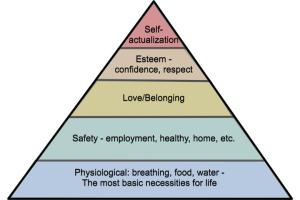
Maslow’s Hierarchy of Needs is a well-known psychological theory that seeks to explain human motivation and behavior. Abraham Maslow, a renowned psychologist, introduced the Hierarchy of Needs concept in his 1943 paper, “A Theory of Human Motivation.”
According to Maslow, human needs can be categorized into a hierarchical structure, starting from the most basic physiological needs and culminating in self-actualization. These needs must be fulfilled in a specific order for personal growth and self-actualization to occur.
This theory has become a cornerstone in the field of psychology. But what if we were to explore it from a biblical perspective? In this article, we will delve into how Jesus would interpret Maslow’s Hierarchy of Needs based on His teachings and the wisdom found in the Bible. We will also look at how Maslow’s theory fails to describe what happens in some real-world decision-making situations.
Understanding the Different Levels of Maslow’s Hierarchy
According to Maslow’s theory, the first and most fundamental level of need is physiological. This category includes basic necessities such as food, water, shelter, and sleep. Once these needs are satisfied, individuals move on to the next level, which is safety needs. Safety needs encompass personal security, health, and financial stability.
The third level is love and belongingness needs, which involve the need for social relationships, love, and a sense of belonging. After these needs are fulfilled, individuals strive for esteem needs, which include self-esteem, recognition, and respect from others. Finally, the pinnacle of the hierarchy is self-actualization needs, which refer to the fulfillment of one’s potential and the desire to achieve personal growth and fulfillment. This includes spiritual growth and development.
Understanding the Concept of Needs in the Bible
The Bible has long been a source of guidance and wisdom for millions of people. It contains valuable insights into the human condition and addresses the concept of needs in various ways. From the very beginning, we see God providing for Adam and Eve’s physiological needs by placing them in the Garden of Eden, a place abundant with food and shelter. Throughout the Old Testament, God continues to provide for His people, demonstrating His care for their physical well-being.
However, the Bible also acknowledges that humans have needs that go beyond the physical realm. It speaks of the need for love, belonging, and purpose. In Psalm 42:1 (NIV), the psalmist declares:
“As the deer pants for streams of water, so my soul pants for you, my God.”
This longing for a deep connection with God transcends the physical and speaks to our spiritual needs. Jesus further emphasizes the importance of these non-physical needs in his teachings.
Exploring the Teachings of Jesus on Fulfilling Human Needs
Jesus, the central figure in Christianity, addressed human needs in a profound and transformative way. He recognized that humans are not merely physical beings. They have deep emotional, social, and spiritual needs as well. In Matthew 5:6 (NIV), Jesus says:
“Blessed are those who hunger and thirst for righteousness, for they will be filled.”
Here, He speaks directly to the need for purpose and righteousness, and He offers a path to fulfillment.
Furthermore, Jesus emphasizes the importance of love and belonging. In Matthew 22:37-39 (NIV), He states:
“Love the Lord your God with all your heart and with all your soul and with all your mind… Love your neighbor as yourself.”
Jesus recognizes that love is a fundamental need for humans, and by cultivating love for God and others, we can experience true fulfillment. He also demonstrated this love through His actions. He healed the sick, fed the hungry, and offered forgiveness. Jesus showed us how to meet the needs of others—through the power of the Holy Spirit.
Comparing Maslow’s Hierarchy of Needs to Jesus’ Teachings
Now that we have explored the concept of needs in the Bible and the teachings of Jesus, let us compare them to Maslow’s Hierarchy of Needs.
Level 1: Physiological Needs
Maslow’s first level of physiological needs includes food, water, shelter, and other basic survival necessities. Jesus, in His teachings and actions, demonstrated the importance of providing for these needs. In Matthew 6:25-26 (NIV), He says:
“Therefore I tell you, do not worry about your life, what you will eat or drink… Look at the birds of the air. They do not sow or reap or store away in barns, and yet your Heavenly Father feeds them ….”
He did, however, often feed people spiritually before He ever fed them with physical food (see Mark 6:30-44). So, while Jesus acknowledged the importance of different levels of needs, He didn’t operate within a strict hierarchy when it came to meeting them.
Level 2: Safety Needs
The second level of the hierarchy includes safety needs such as security, stability, and protection. Jesus addresses these needs when He assures his followers in Matthew 28:20 (NIV):
“And surely I am with you always, to the very end of the age.”
He offers His followers a sense of security by promising His presence and guidance, assuring us that we are never alone. Note, however, that this also bleeds in to the third level of needs. Once again, this shows how, to Jesus, the hierarchy levels are more fluid and interactive. Not linear and exclusive.
Level 3: Belonging Needs
The third level of Maslow’s hierarchy encompasses love and belonging needs. Jesus teaches us the importance of love and belonging through His commandment to love God and others.
In John 13:34-35 (NIV), He states:
“A new command I give you: Love one another. As I have loved you, so you must love one another. By this everyone will know that you are My disciples if you love one another.”
Jesus highlights the significance of love and belonging in our lives and encourages us to cultivate meaningful relationships, both with God and with others around us.
Level 4: Esteem Needs
Maslow’s fourth level consists of esteem needs, including self-esteem and the recognition of and respect for others. In Jesus’ teachings, He emphasizes the importance of humility and finding our worth in God, rather than seeking validation from others.
In Matthew 23:12 (NIV), He says:
“For those who exalt themselves will be humbled, and those who humble themselves will be exalted.”
Jesus encourages us to find our true value in our relationship with God and to treat others with humility and respect.
Level 5: Self-Actualization Needs
Finally, we come to the fifth level of Maslow’s hierarchy, self-actualization needs. This level represents the fulfillment of one’s potential and the pursuit of personal growth and purpose. Jesus teaches us that true fulfillment comes from aligning our lives with God’s purpose.
In Matthew 16:24 (NIV), He says:
“Whoever wants to be My disciple must deny themselves and take up their cross and follow me.”
Jesus challenges us to let go of our own desires and ambitions, and instead, seek God’s will for our lives. By doing so, we can reach our full potential and experience self-actualization in a divine sense. Not just elevation of ourselves, but growth into the God-honoring servants Jesus wants us to be.
Limitations to Maslow’s Theory from a Secular Perspective
Despite its popularity, Maslow’s Hierarchy of Needs has faced significant criticism because of its numerous limitations. One of the main critiques is the assumption of a strict hierarchy, and the implication that each level must be completely satisfied before moving on to the next.
In reality, individuals often have simultaneous needs across multiple levels, and the fulfillment of one need does not necessarily result in the neglect of others. We see this played out in the various instances in which Jesus met more than one need simultaneously for an individual.
Additionally, Maslow’s theory is based on a Western cultural perspective and may not be universally applicable. Different cultures and societies have varying definitions of what constitutes a need, and these definitions can greatly influence individual motivation and behavior. Maslow’s theory also fails to consider external factors such as socioeconomic conditions and systemic inequalities, which can significantly impact an individual’s ability to fulfill their needs.
Debunking Maslow’s Theory with Real-Life Examples
To further illustrate the limitations of Maslow’s theory, let’s consider a real-life example. Imagine a person who is struggling to meet their physiological needs due to poverty and lack of access to basic resources. According to Maslow’s theory, this individual should not be concerned with safety needs, love and belongingness needs, or esteem needs until their physiological needs are met. However, in reality, this person may still strive for social connection, self-esteem, and personal growth despite their immediate circumstances.
This example highlights the flaws in Maslow’s theory and the complexities of human needs. It demonstrates that individuals are not necessarily bound by a strict hierarchy. The fulfillment of higher-level needs can still be pursued even when lower-level needs are not fully satisfied.
Our Lord Jesus, who created us and put our needful hearts inside us, certainly knew this. That is why He sought to fill every need for every person He met. Indeed, He is the fulfillment of every human need (see Philippians 4:19).
The Complexities of Human Needs
In Jesus’ day, and even in modern society, a thorough understanding of human needs goes beyond the simplistic framework proposed by Maslow’s theory. The complexity of human needs is influenced by various factors, including culture, individual experiences, and societal expectations. For example, in a collectivist culture, the need for social connection and belongingness may be prioritized over individualistic needs for self-actualization.
Furthermore, the rapid advancements in technology and globalization have altered the landscape of human needs. Individuals now have access to a vast array of opportunities and experiences, thus leading to an expansion of needs beyond the traditional hierarchy. The pursuit of self-actualization, for instance, can take on different forms, such as personal growth through online learning or creative expression through digital platforms.
Often digital creators get lost in their work and forget to eat. In this way, they seek to meet their Level 5 needs before their Level 1 needs.
Factors that Challenge the Validity of Maslow’s Theory
Maslow’s theory fails to account for the role of external influences and environmental factors in shaping human needs. For example, the impact of social media and the constant exposure to curated lifestyles can create new needs related to social validation and comparison. The theory also overlooks the influence of cultural norms and societal expectations, which can significantly shape an individual’s perception of their needs and aspirations.
In addition, Maslow’s theory assumes individuals are primarily motivated by their own needs and self-actualization. However, research has shown that individuals are also motivated by the desire to contribute to society and make a positive impact on others. This goes beyond the self-centric nature of Maslow’s theory.
Those of us who are followers of Christ, and who seek to live according to His commandments to love others, will make decisions based not our own desires and needs. At least, we won’t always act according to our own needs, when someone else’s good might be at stake. Our motivation is often Christ- or other-centered. Not self-centered.
The Importance of Context in Defining Human Needs
To truly understand human needs, it is crucial to consider the importance of context. The fulfillment of needs is not solely determined by an individual’s internal motivations. Rather, it is shaped by external factors such as cultural norms, socioeconomic conditions, and personal circumstances. What may be considered a need in one context may not hold the same significance in another.
Context also plays a role in the interpretation and prioritization of needs. For example, in times of crisis or emergency, individuals may prioritize their physiological and safety needs over higher-level needs. On the other hand, in times of stability and abundance, individuals may have the luxury to focus on self-actualization and personal growth.
Applying a Holistic Approach to Understanding Human Needs
Taking into account the complexities and contextual nature of human needs, it is essential to adopt a holistic approach in understanding and addressing these needs. This approach requires considering the interplay between various factors such as cultural influences, socioeconomic conditions, individual experiences, and personal values.
A holistic approach also recognizes the interconnectedness of different needs and the potential for simultaneous pursuit. Rather than viewing needs as a linear hierarchy, this approach acknowledges that individuals can have simultaneous needs across various levels, and that the fulfillment of one need can contribute to the fulfillment of others.
Rethinking Maslow’s Hierarchy of Needs
While Maslow’s Hierarchy of Needs has long been regarded as a foundational theory in psychology, it falls short in capturing the complexities of human needs. The theory’s strict hierarchy, cultural biases, and failure to account for external influences limit its applicability and relevance.
To better understand human needs, we must move beyond the confines of Maslow’s theory and explore alternative frameworks that consider the multifaceted nature of human motivation and behavior, especially theories based on a biblical perspective.
By embracing a holistic approach and acknowledging the importance of context, we can gain a more comprehensive understanding of human needs. In so doing, we pave the way for a more inclusive and nuanced perspective on personal growth and fulfillment. We open the door to a biblical understanding of a psychological problem.
A Divine Perspective on Human Needs
In exploring how Jesus would react to Abraham Maslow’s Hierarchy of Needs, we discover a profound convergence between psychology and spirituality. While Maslow’s hierarchy provides a valuable framework for understanding human needs, we gain a deeper understanding of these needs through the teachings of Jesus and the wisdom found in the Bible.
Jesus not only addresses our physiological and safety needs. He also recognizes the importance of love, belonging, esteem, and self-actualization in our lives. Through His teachings and actions, as well as the work of the Holy Spirit in our hearts, He offers a path to fulfillment that goes beyond the physical realm. By aligning our lives with his teachings, we can find true purpose and meaning, experiencing a fulfillment that transcends the limitations of Maslow’s hierarchy.
As we reflect on the biblical lens through which we interpret human needs, may we be inspired to seek a holistic approach to our well-being, recognizing the interconnectedness of our physical, emotional, social, and spiritual selves. Through a deeper understanding of our needs and the teachings of Jesus, we can embark on a transformative journey towards true fulfillment and self-actualization.
If you found this article insightful, I encourage you to further explore the teachings of Jesus and the wisdom found in the Bible. By delving into the biblical perspective on human needs, you may discover new insights that can enhance your growth and well-being.
















